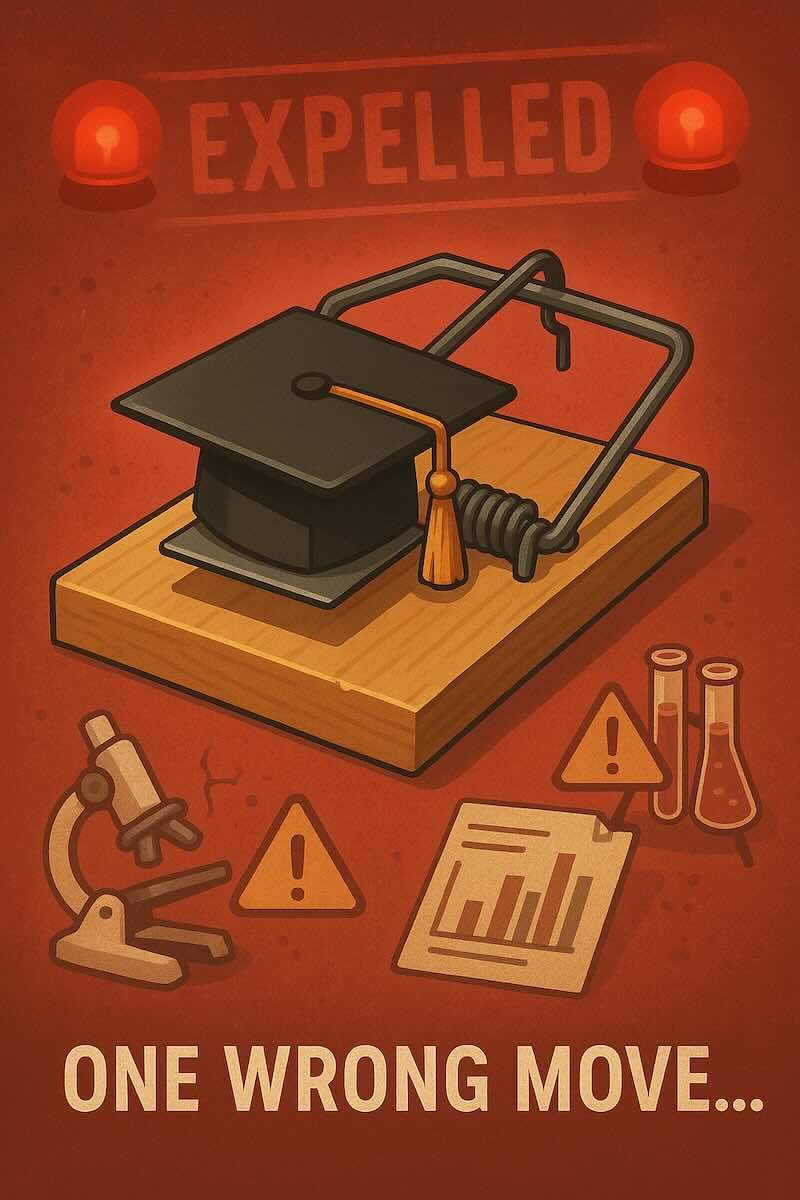🚨 Research Career Killers Exposed! 12 Deadly Mistakes You Must Avoid 🚨
-
Ever thought you could get away with a little data tweaking? Or sneakily slack off in the lab without anyone noticing? Think again!
Drawing from 100+ real expulsion cases and the survival rules of top labs, here are the 12 deadly traps every researcher must steer clear of.
When I hit number 5, I almost passed out...
1. Academic Misconduct: One Step from Clever to Cancelled
1.1 "Beautifying" Data: Photoshop Today, Lab Shutdown Tomorrow
Case: A master's student at a top university edited Western blot images, only to get busted by ImageTwin. Result?
Three papers from the lab were retracted, the advisor got dragged into the mess, and the lab funding was frozen for two whole years.Tools:
- Use Forensic Droplets to check for image tampering.
- Use PlagScan to spot suspicious text overlaps.
1.2 Ghostwriting: The Dark Temptation That Ends Careers
Stats: In 2024, the Ministry of Education reported 217 ghostwriting cases. Students were expelled and advisors banned from recruiting for at least three years.
Pro Tip:
Use Turnitin’s private repository feature to sniff out ghostwritten papers early. (Most ghostwriters just spam ChatGPT outputs and the writing patterns are detectable!)
2. Lab Life: One Mistake and You're Out
2.1 Secretly Redoing Experiments: Fabricating Data is a Fast Lane to Disaster
True Story: A PhD student at a prestigious research institute secretly redid three sets of experiments to cover up negative results.
A lab mate ratted them out and their degree was revoked.Survival Tip:
Always record original data with timestamps and instrument settings screenshots.
Tools like LabArchives help with real-time uploads.2.2 Equipment Killer: Destroy a Million-Dollar Machine Instantly
Horror Story: A first-year grad student operated a cryo-EM without proper training. Liquid nitrogen leaked, and the machine was a total loss.
Damage: $3 million!Life Saver Tip:
Get certified to use high-risk equipment (like the Leica microscope systems).
3. Thesis Writing: Rookie Mistakes That Make Reviewers Rage
3.1 Citing "Trash Journals": Career Reputation Destroyed
Example: A PhD student cited three papers from Scientific Reports.
The thesis committee questioned their academic standards, delaying graduation by a year.Safety Check:
Use LetPub to check if a journal is blacklisted.
Make sure over 60% of your references are from top-tier journals (CAS Zone 1).3.2 Mass-Producing Co-First Authors: Big No-No
Epic Fail: One research group listed six co-first authors on a Cell paper.
They became an academic meme, and the editor publicly blacklisted them forever.Golden Rule:
Top journals typically allow no more than two co-first authors, and you must detail each contribution clearly in the cover letter.
4. Advisor Relationships: Cross These Lines and Say Goodbye
4.1 Reporting Issues Without Advisor Communication: Instant Death Sentence
Taboo: Skipping your advisor and going straight to the department to report data problems?
One PhD student at a top university did exactly that.
Outcome? Accused of defamation, expelled.Safe Move:
Use encrypted email (like ProtonMail) to anonymously report to the Academic Ethics Committee.4.2 Unauthorized Submissions: Intellectual Property Disaster
Painful Lesson: A master's student submitted a paper using unauthorized project data.
Their advisor sued them for IP theft, winning $70,000 in damages.Best Practice:
Sign a Lab IP Agreement when you start. All submissions must have PI approval.
5. Social Landmines: Unwritten Rules Nobody Will Tell You
5.1 Posting Negative Results on Social Media: Free Ideas for Competitors
Real Case: A researcher vented about failed experiments on social media.
A competitor swooped in and published a similar paper in Nature first.Smart Move:
Keep a private research log on tools like Notion.
Never send experimental data via WeChat.5.2 Oversharing at Conferences: Idea Theft Happens
Trap: A PhD student casually shared unpublished ideas during a conference coffee break.
Three months later, a suspiciously similar paper popped up on arXiv.Defense Strategy:
Blur out sensitive data when presenting and use DeepL to cryptically phrase technical details.
6. Thesis Submission: How to Get Your Degree Revoked
6.1 Copying from Your Own Master's Thesis: Still Counts as Plagiarism
Hidden Rule: If your PhD dissertation overlaps more than 10% with your own master's thesis, it is considered academic misconduct!
One prestigious university revoked seven PhD degrees for this in a single year.Tool Kit:
- Use iThenticate to check for cross-language overlaps.
- Use QuillBot to paraphrase and lower duplication rates.
6.2 Plagiarizing Your Acknowledgements: Public Humiliation at Its Finest
Disaster Scene: A PhD candidate copied a popular thank-you note from Zhihu.
During the defense, the committee played a side-by-side comparison video!Quick Fix:
Use ChatGPT to generate a personalized acknowledgment.
Example Prompt:
"Write a sincere, non-cringey PhD thesis acknowledgment mentioning my advisor, family, and pet."
 Final Words
Final WordsResearch is a marathon, not a sprint.
Every shortcut you take could end your career faster than you can say "impact factor."
Stay sharp, stay clean, and remember: one mistake can cost you everything.
